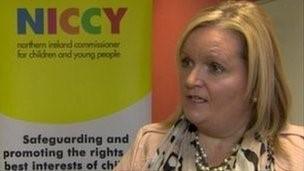Twenty-nine vulnerable children arrive alone in Northern Ireland
- Published

NI Children's Commissioner Patricia Lewsley-Mooney said the separated children formed a small but extremely vulnerable group
Twenty-nine 'separated children' arrived in Northern Ireland between 2009 and 2013 a report has found.
A 'separated child' can be an asylum seeker arriving without the support of their parent or carer, a migrant child arriving alone or a child who may have been trafficked into Northern Ireland.
The report was commissioned by the NI Children's Commissioner Patricia Lewsley-Mooney.
The commissioner said more support must be given to those young people.
On Sunday BBC Radio Ulster broadcast a documentary, Nowhere To Go, about asylum seekers and refugees living in Northern Ireland.
Ms Lewsley-Mooney said: "Separated Children are a relatively small, largely invisible but extremely vulnerable group of children in our society who are subject to a maze of bureaucracy.
Vulnerable children
"As they arrive on our shores, no matter how they got here, they are in our care and we must protect them," she said.
"These vulnerable young people, who may not have English as a first language, will have to come into contact with many different professionals for many different reasons including asylum and immigration, social services and police."
"The report outlines the processes these young people have to go through and it is clear that improvements and co-ordination of services are needed to protect them.
"At the minute the support they receive is inconsistent and reliant on the specific skills, knowledge and experience of individual professionals."
The report points out that the United Nations Committee on the Rights of the Child has set out that a 'guardian' should be in place for all separated children.
"No matter who provides the service, this report clearly sets out the need for a 'guardian' in these children's lives," said Ms Lewsley-Mooney.
"The child may have experienced or witnessed horrible things in their own country or on their journey here.
"They need someone who will always consider their best interests, who is informed and present in all planning and decision making processes, and who is equipped to deal with the child's legal, physical, emotional and psychological needs."
Ms Lewsley-Mooney added: "We also need to look at the new data now collected by the health and social care board.
"It actually threw up 12 (separated) children just between 2012 and 2013, while the numbers were 17 over the previous three years.
"We now see 12 in one year and again, that's only those we know about. It's obviously small numbers, but for me it's on the increase."
The BBC Radio Ulster documentary, Nowhere To Go, about asylum seekers and refugees living in Northern Ireland is now available on BBC iPlayer.
- Published16 February 2014
- Published14 February 2014
- Published14 February 2014